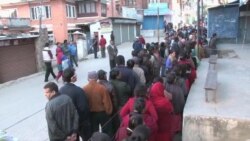KATHMANDU, NEPAL —
Voters in the Himalayan nation of Nepal cast ballots Tuesday for a new Constituent Assembly in hope of ending years of political gridlock following the abolishment of the monarchy and the creation of a democratic republic in 2008.
While Nepal’s capital remained clear of traffic with vehicles barred from the road for Tuesday’s election, many of the country’s more than 12 million eligible voters packed polling places like this one in Kathmandu's historic Durbar Square.
Twenty-three-year old graduate student Niva Bajracharya has high expectations that a newly elected 601-member Constituent Assembly will help create jobs for the growing young population.
“We definitely want to do something for our country and for that we need the environment and we need the opportunity, because we can do the best for our country,” said Bajracharya.
But many here say in order to focus on the economy, infrastructure, and Nepal’s other pressing issues, politicians must learn to get past their differences.
As part of the peace process that ended the country’s 10-year civil war, former insurgent Maoists joined the government and won the most seats in the newly formed parliamentary body. Still, five years and several failed governments later, lawmakers have yet to agree to a structure of government or a draft constitution.
Constituent Assembly candidate and Buddhist Reverend Thapassi Dhamma says voters want peace and an end to the political deadlock.
“We are hoping that with this election, they will make a new constitution in Nepal,” said Thapassi Dhamma.
But drafting a constitution and coming to a consensus may not be so easy. A Maoist splinter group has threatened to disrupt the election.
Small bomb blasts have also been reported in and outside of Kathmandu. Thousands of police and military personnel deployed Tuesday to prevent further violence.
Up to 75,000 observers from more than 50 national and international organizations are here monitoring the election and ensuring the vote takes place freely and fairly.
Tulsi Thappa, an election observer with the Human Rights Council of Nepal, is traveling to polls, talking to those administering the vote as well those waiting to cast their ballots.
“We are observing the security situation and trying to determine if the voters feel fear or pressure to participate in the election,” he said.
Many Nepalis, like Anoop Sthepat, just want their vote to help move the former Himalayan kingdom forward.
“After this election, we think we will have a little bit of progress in our country," he said.
It’s a hope shared by the United States and others in the international community who will be watching closely as authorities count ballots to determine who, if anyone, can lead Nepal away from political dysfunction and towards greater stability.
While Nepal’s capital remained clear of traffic with vehicles barred from the road for Tuesday’s election, many of the country’s more than 12 million eligible voters packed polling places like this one in Kathmandu's historic Durbar Square.
Twenty-three-year old graduate student Niva Bajracharya has high expectations that a newly elected 601-member Constituent Assembly will help create jobs for the growing young population.
“We definitely want to do something for our country and for that we need the environment and we need the opportunity, because we can do the best for our country,” said Bajracharya.
But many here say in order to focus on the economy, infrastructure, and Nepal’s other pressing issues, politicians must learn to get past their differences.
As part of the peace process that ended the country’s 10-year civil war, former insurgent Maoists joined the government and won the most seats in the newly formed parliamentary body. Still, five years and several failed governments later, lawmakers have yet to agree to a structure of government or a draft constitution.
Constituent Assembly candidate and Buddhist Reverend Thapassi Dhamma says voters want peace and an end to the political deadlock.
“We are hoping that with this election, they will make a new constitution in Nepal,” said Thapassi Dhamma.
But drafting a constitution and coming to a consensus may not be so easy. A Maoist splinter group has threatened to disrupt the election.
Small bomb blasts have also been reported in and outside of Kathmandu. Thousands of police and military personnel deployed Tuesday to prevent further violence.
Up to 75,000 observers from more than 50 national and international organizations are here monitoring the election and ensuring the vote takes place freely and fairly.
Tulsi Thappa, an election observer with the Human Rights Council of Nepal, is traveling to polls, talking to those administering the vote as well those waiting to cast their ballots.
“We are observing the security situation and trying to determine if the voters feel fear or pressure to participate in the election,” he said.
Many Nepalis, like Anoop Sthepat, just want their vote to help move the former Himalayan kingdom forward.
“After this election, we think we will have a little bit of progress in our country," he said.
It’s a hope shared by the United States and others in the international community who will be watching closely as authorities count ballots to determine who, if anyone, can lead Nepal away from political dysfunction and towards greater stability.






